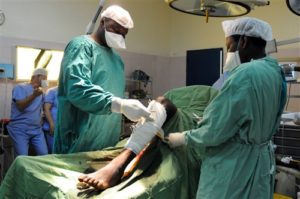A Surgical “college without walls”
Líbhan Collins, Key Correspondent for the Irish Forum for Global Health
The second day of the Irish Forum for Global Health Exchange Conference boasted speakers from a wide variety of organisations. One particular focus was on on partnerships and interdisciplinary actions in the broad field of work that is global health. One such partnership is the College of Surgeons, East, Central and Southern Africa (COSECSA) and the RCSI.
Opening the presentation, RCSI’s Deirdre Mangoang stressed the importance of surgical training and the impact of an unskilled health workforce. She shared a picture of Salome Karwah, a Liberian nurse and Time magazine’s person of year in 2014 for her efforts treating patients with Ebola. In 2017, this skilled and respected nurse died from post-operative complications following a cesarean section. As highlighted by the speaker, this surgical procedure is a relatively common and should not result in death, yet this is likely not an isolated case. Globally, five billion people have limited access to safe or sterile surgery due to financial barriers or lack of availability. Largely, it is low to middle income countries facing lack of trained surgeons. On top of this, many operations carried out in under-developed areas are done by non-physicians.

COSECSA is a non-profit organisation receiving guidance from the RCSI and supported by funding from Irish Aid. This programme trains surgeons in partnership with RCSI, and academic online learning is paired with onsite clinical training. Currently there are 600 surgeons being trained in African Countries. ‘College without walls’ refers to surgeons being trained in the field rather than stationed in a college or university. The partnership allows graduates to stay in their home country or within Africa contributing to economic growth and to improvements in health outcomes. This results, for example, with conjoined twins being able to stay in Zambia for surgery. In February 2018 this was a major landmark for medicine in Zambia. Omphalopagus twins, with joined liver and intestine, were surgically separated in the University Teaching Hospital of Lusaka. Training surgeons in the country meant the family didn’t have to travel or seek foreign assistance.
Global surgery is an emerging area in health with room for growth. RCSI recently established an institute for global surgery to further training, research, and advocacy with the desire to increase their contribution to improving health outcomes in low and middle income countries. This partnership paves the way for a long term, stable health system where all kinds of surgeries can take place by skilled and trained professionals in a suitable environment. Together, COSECSA and RCSI are not just giving aid to African countries. They are helping to establish a self-sufficient culture of highly-skilled and competent surgeons to reduce mortality rates and increase life expectancy.
7th November 2018
CATEGORIES
- Restore Humanity Campaign
- Equity in Action Blog
- Training Programmes
- Sponsorship
- Vaccine Equity
- Get Global – Global Health Talks
- Student Outreach Team
- Get Global Young Professionals Talk Global Health
- Global Health Matters – Live Event Series
- Global Health Matters – IGHN Live Event Series
- An initiative of Irish Global Health Network
- ESTHER Ireland and ESTHER Alliance for Global Health Partnerships
- Global Health Matters – Webinar Series
- ESTHER
- IGHN Conferences
- Global Health Conference 2020
- Women in Global Health – Ireland Chapter
- ESTHER Partnerships
- Weekly Webinar Series
- 4th Global Forum on HRH
- Access to Medicines
- Archive Page Weekly COVID Webinars
- Clean Cooking 2019
- Climate Change and Health Conference 2017
- Conference Abstracts
- Conference Materials
- Covid FAQ
- COVID Funding Opportunities
- COVID-19
- COVID-19: Gender Resources
- Dashboard and online resources
- Education
- ESTHER Alliance
- Events
- Events & News
- Funding covid
- Global Health Exchange 2018
- Global Health Exchange 2019
- Global Health symposium 2019
- Health Workforce/HRH
- Homepage Featured
- Homepage recent posts
- IFGH 2011-2012 Conference and Events
- IFGH 2014 Conference
- IFGH Multimedia
- Irish AIDS Day 2017
- Irish News and Feeds
- Key Correspondent Articles
- Key Correspondent News
- Maternal Health
- Multimedia
- News
- News & Events
- Newsletter
- Opportunity
- Our LMIC's Resources for COVID19
- Partner Country News and Feeds
- Past Events
- Policy
- Presentations
- Recurring events
- Reports & Publications
- Research
- Resources
- Student Outreach Group
- Students Corner
- TEDTalks
- TRAINING COURSES FOR HEALTH CARE PROFESSIONALS
- Uncategorized
- Upcoming Events
RECENT POSTS

Impact testimonies- Lombani

Impact Testimony – Shadrick

Power, Inequality, Decolonisation – and Living My Recovery By Bronwyn April

Global Health Without Borders: Reflections on the Power of Diverse Voices

IGHNxEU – Empowering Women for a Healthier Europe

